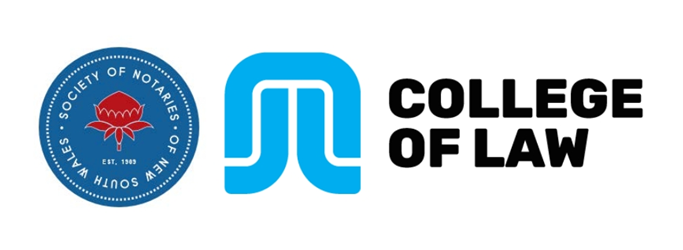UPSKILL WITH IN-DEMAND QUALIFICATIONS
Our short courses are developed by practitioners, for practitioners to help you get the most in-demand qualifications to enhance your career.
Whether you want to become an accredited mediator, grow your dispute resolution skills, become a notary or an international arbitrator, prepare yourself to take on a leadership role, or even start your own law firm - find short courses that will help you get to where’s next.
Recognised and approved
The only prescribed Notarial Practice course in NSW, delivered in cooperation with the Society of Notaries NSW.
Authenticate documents
The ability to authenticate official Government and personal documents and information.
NOTARIAL PRACTICE
Notarial Practice
Become
a Notary Public
Attend:
Live in-person
Earn:
19 CPD units
Earn:
Certificate of Completion
The College of Law, in partnership with the Society of Notaries of New South Wales, is authorised to train barristers or solicitors with at least five years of experience seeking appointment as a Public Notary under the Public Notaries Act 1997 (NSW). Upon successful completion, you can apply to the Legal Profession Admissions Board (LPAB) for appointment by the Supreme Court of NSW as a Public Notary.
Due to high demand and limited places, we encourage early registration. To be added to the waitlist for future intakes, please register your interest by sending an enquiry to cpd@collaw.edu.au.

OUR EDUCATORS
Meet your Notarial educators


Mr Colin Dunston
Secretary and Treasurer
The Society of Notaries NSW


Mr Peter Snelgrove
Council Member and past President
The Society of Notaries NSW
INSPIRE AND ENABLE YOUR STAFF TO UPSKILL
Choose from our selection of on-demand qualifications and short courses.
FREQUENTLY ASKED QUESTIONS
The course is open to barristers or solicitors who have been in practice for a minimum of five years and meet the eligibility criteria set by the Legal Profession Admissions Board (LPAB).
The course is scheduled to run in May and September. Due to high demand and limited places, early registration is encouraged.
To be added to the waiting list for future intakes, please register your interest in sending an enquiry to cpd@collaw.edu.au
Yes, however, please be aware that Section 11 of the Public Notaries Act 1997 (NSW) restricts public notaries who are not part of a law practice (for example, in-house counsel) from performing notarial work for their employer or a client of their employer.
This course is recommended for private practice practitioners.
Please read the Legal Profession Admission Board’s ‘Guide for Applicants for Appointment as a Public Notary,’ which is available here.
If you have any doubts about your eligibility for appointment as a Notary, please contact the Legal Profession Admission Board (LPAB) before enrolling in the course.
For detailed information about the recommended fees for performing notarial work, please visit the Society of Notaries website here.
To successfully complete the course and be eligible to apply for appointment as a Notary, participants must:
- Attend and participate in all sessions of the training course
- Achieve a grade of 75% in each section of the take-home examination



